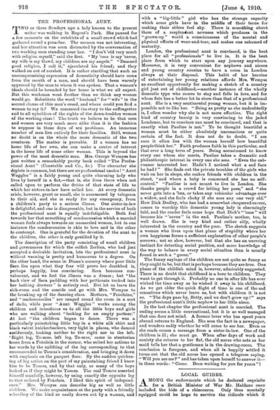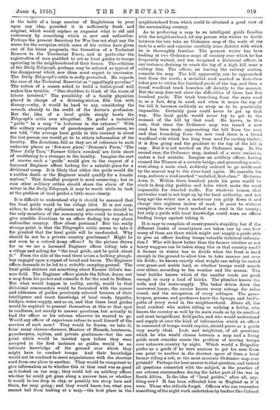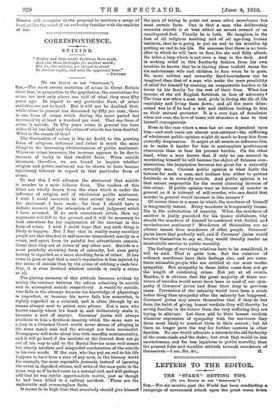LOCAL GUIDES.
AMONG the endowments which he declared requisite for a British Minister of War Mr. Haldane once included the hide of a rhinoceros. Only thus mentally equipped could he hope to survive the ridicule which it is the habit of a large number of Englishmen to pour upon any idea, provided it is sufficiently fresh and original, which would replace or augment what is old and customary by something which is new and unfamiliar. Perhaps the present Secretary for War has not slept any the worse for the reception which some of his critics have given one of his latest proposals, the formation of a Technical Reserve to the Territorial Force, and in particular the registration of men qualified to act as local guides to troops operating in the neighbourhood of their homes. The criticism of the Daily Telegraph, perhaps, may be selected as typical of the disapproval which new ideas must expect to encounter. The Daily Telegraph's critic is sadly perturbed. He regards the case of the Technical Reservist as "appallingly peculiar." The notion of a mason asked to build a bullet-proof wall makes him tremble. "One shudders to think of the waste of labour involved." The possibility of a family physician placed in charge of a dressing-station fills him with dismay,—why, it would be hard to say, considering the records already to the credit of the doctor's profession. But the idea of a local guide simply bowls the Telegraph's critic over altogether. To prefer a technical " guide " to a map "is ludicrous in the extreme." With the solitary exceptions of gamekeepers and policemen, we are told, "the average local guide in this country is about the last person one would go to to obtain information of the locality. His directions, full as they are of reference to such unknown places as five-acre piece," Duncan's Farm,' The Three Jolly Tars,' Farmer Giles's cowshed,' are little short of maddening to a stranger in the locality. Imagine the sort of answer such a guide' would give to the request of a harassed Engineer officer looking for a suitable place for a divisional camp. It is likely that either the guide would die a sudden death or the Engineer would qualify for a lunatic asylum." This dreadful prospect is most unnerving ; but in case other military critics should share the alarm of the writer in the Daily Telegraph, it may be worth while to look at the problem of local guides a little more closely.
It is difficult to understand why it should be assumed that the local guide would be the village idiot. It is not easy, either, to decide why policemen and gamekeepers should be the only members of the community who could be trusted to give sensible directions to an officer finding his way about unfamiliar country. How about postmen P But the really strange point is that the Telegraph's critic seems to take it for granted that the local guide will be uneducated. Why should he not be a private country gentleman? Might he not even be a retired Army officer P In the picture drawn for us we see a harassed Engineer officer riding into a a village and asking for "the local guide, and be quick about it." From the side of the road there arises a hulking plough- boy engaged upon a repast of bread and bacon. The Engineer officer demands to be led to a suitable camping-ground. The local guide stutters out something about Farmer Giles's ten- acre field. The Engineer officer pistols the fellow, draws out a map from his pocket and consults it for the road to Bedlam. But what would happen in reality, surely, would be that divisional commanders would be furnished with the names and addresses of guides previously selected because of their intelligence and exact knowledge of local roads, bypaths, bridges, water-supply, and so on, and that these local guides would be required to present themselves at this or that spot in readiness, not merely to answer questions, but actually to lead the officer or his column wherever he wanted to go. Would any officer of experience refuse to avail himself of the services of such men P They would be drawn, we take it, from many classes—farmers, Masters of Hounds, huntsmen, gamekeepers, squires, and private gentlemen—but the one point which would be insisted upon before they were accepted in the first instance as guides would be an intimate knowledge of the ground over which they might have to conduct troops. And their knowledge would not be confined to mere acquaintance with the shortest road from one place to another. They would be competent to give information as to whether this or that road was as good as it looked on the map ; they could tell an artillery officer whether he could get guns along a narrow lane, or whether it would be too deep in clay, or possibly too steep here and there, for easy going; and they would know, too, what you cannot tell from looking at a map,—the best place in the neighbourhood from which could be obtained a good view of the surrounding country.
As to preferring a map to an intelligent guide familiar with the neighbourhood, let any person who wishes to decide between the two take an Ordnance map of the scale of one inch to a mile and examine carefully some district with which he is thoroughly familiar. The present writer has been looking at two Ordnance maps of country over which he has frequently walked, and has imagined a divisional officer, in one instance, desiring to reach the top of a high hill near a railway line. The officer, on leaving the railway station, consults his map. The hill, apparently, can be approached best from the north ; a metalled road marked as first-class takes you to within five hundred yards of the top, and then a broad woodland track branches off directly to the summit. But the map does not show the difficulties of those last five hundred yards. The track branching from the main road is, as a fact, deep in sand, and when it nears the top of the hill it becomes suddenly so steep as to be practically impossible. Certainly guns could never be got up that way. The local guide would never try to get to the summit of the bill by that road. He knows, in this case, that since the Ordnance map was issued a new road has been made approaching the hill from the east, and that branching from the new road there is a broad woodland ride which has long been used for carting timber ; it is firm going and the gradient to the top of the hill is easy. But it is not marked on the Ordnance map. In the second case, the Ordnance map, instead of a mere omission,
makes a bad mistake. Imagine an artillery officer, having crossed the Thames at a certain bridge, and proceeding south- west along a main road, suddenly ordered to go north-east by the nearest way to the river-bank again. He consults his map, and sees a road marked " metalled, first-class." He turns down it. Within three hundred yards his guns weaild be stuck in deep clay puddles and holes which make the road impassable for wheeled traffic. For whatever reason, that particular road is not kept up by the local authority, and not long ago the writer saw a motor-car run gaily down it and charge into eighteen inches of mud. It must be without exception the worst track marked as a road in the county ; but only a guide with local knowledge could warn an officer leading troops against taking it.
It is easy to complain of countrymen's stupidity, but if the different trades of countrymen are taken one by one, how . many of them are there which might not supply a guide able to give an officer leading troops valuable technical informa- tion P Who will know better than the farmer whether or not heavy waggons can be taken along this or that country road P A farmer in winter has to decide when the frost is hard enough in the ground to allow him to take manure out over his fields ; he knows exactly what weight can safely be carted over grass and arable land, or whether troops could march over either, according to the weather and the season. The local builder knows which of the smaller roads are good enough to carry a load of bricks. The plumber knows the wells and the water-supply. The baker drives down the narrowest lanes ; the carrier knows every cottage for miles round, and the occupation of every cottager. The game- keepers, grooms, and gardeners know the byways and bridle- paths of every wood in the neighbourhood. Above all, the local resident who makes riding or walking a hobby, who knows the country as well by its main roads as by its smallest and most insignificant field-paths, and who would understand and supply at once the kind of information which an officer in command of troops would require, should prove as a guide very nearly ideal. Last, and weightiest, of all questions which he who would choose between a map and a living guide must consider comes the problem of moving troops over unknown country by night. Which would a Brigadier prefer as a guide if he were anxious to got his men from one point to another in the shortest apace of time, a local farmer riding a cob, or the most accurate Ordnance map ever printed P Perhaps the best answer to that question, and indeed all questions connected with the subject, is the practice cf our column commanders during the latter part of the war in South Africa. Is the idea of "local guides," after all, any- thing new P It has been ridiculed here in England as if it were. Those who ridicule forget. Officers who can remember something of the night work undertaken by leaders like Colonel
Benson will recognise in the proposal to institute a corps of local guides the mind of an authority familiar with the realities of war.




















































 Previous page
Previous page